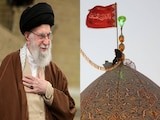NASA is celebrating the 25th anniversary of the International Space Station, a program which brings together international flight crews, multiple launch vehicles, globally distributed launch and flight operations, training, engineering, and development facilities, communications networks, and the international scientific research community. On this day, the first two modules of the International Space Station, Zarya and Unity, were joined during the STS-88 mission of the space shuttle Endeavour. The Canadarm robotic arm of the shuttle reached out and grabbed Zarya, which had been in orbit for just over two weeks, before attaching it to the Unity module stowed inside Endeavour's payload bay.
To mark the occasion, NASA shared before and after pictures of the International Space Station and said, "How it started vs. how it's going. Today marks the 25th anniversary of operations on the International Space Station (@ISS). On Dec. 6, 1998, the station's first two elements-the Unity and Zarya modules-were joined in low Earth orbit."
It added that since November 2, 2000, humans have lived and worked continuously on the orbiting laboratory, bringing together international flight crews to perform more than 3,300 research and educational investigations for the benefit of humanity. "The ISS has been visited by 273 people from 21 countries working together to prepare future human explorations for travel to the Moon, Mars, and beyond," the American space agency wrote in the caption on Instagram.
In the first image, which is from more than two decades ago, the space station can be seen in space. "View of the space station circa 2000 in the darkness of space. It consists of two cylindrical modules joined at their short ends. The Unity module on the left is slightly more gray than the longer cream-colored Zarya module on the right. A pair of solar panels extend upwards and downwards from Zarya," NASA said while describing the image.
Discussing the current space station, the American agency posted a picture of the station as seen during a fly-around by the SpaceX Crew Dragon Endeavour that took place following its undocking from the Harmony module's space-facing port on Nov. 8, 2021. Further, four pairs of golden solar arrays can be seen on each side, and three different sets of grey radiator panels accordion upward. According to NASA, the entire spacecraft is nearly the size of a football field.
Meanwhile, the Space Station was officially approved by United States President Ronald Reagan and a budget approved by the US Congress in 1984. The Station was designed between 1984 and 1993. The elements of the Station were in construction throughout the US, Canada, Japan, and Europe.
They also said that the Station will be functioning at least for another seven years. "The intended life span of ISS has been extended several times. Since several elements are now beyond their originally intended lifespans, analyses are conducted periodically to ensure the Station is safe for continued habitation and operation. Much of the Station is modular and so as parts and systems wear out, new parts are launched to replace or augment the original. The ISS will continue to be a working laboratory and outpost in orbit until at least 2030," the space agency said.















